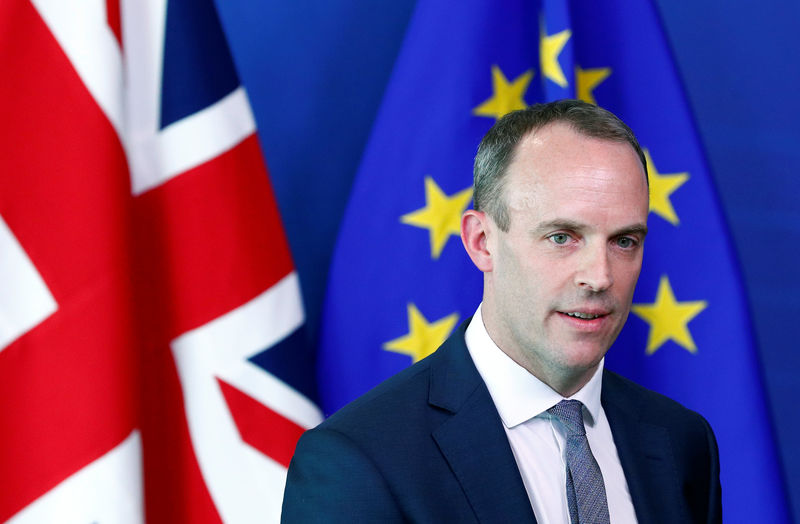By Elizabeth Piper and William James
LONDON (Reuters) - Britain has put forward a "real offer" to a win a deal on leaving the European Union by October, Brexit Secretary Dominic Raab said on Tuesday, suggesting the government would not shift much from its agreed negotiating stance.
With just under three months before Britain and the EU want to agree a deal to end over 40 years of union, Prime Minister Theresa May is struggling to sell what she calls her business-friendly Brexit to her own party and across a divided country.
The EU has tentatively welcomed what has become known as the Chequers plan, but also says the proposals for a free trade areas with the bloc on goods raises "more questions than answers" and has stepped up its warnings of a "no deal" outcome.
But May's two negotiators, Raab and Europe adviser Oliver Robbins, suggested that the Chequers plan was Britain's last attempt to get a deal that will usher in the country's biggest policy shift for decades.
"This is, as we have engaged in that dialogue towards the end date of October, a real offer to get us across the line," Raab told a parliamentary committee.
"We are at a mature stage in these negotiations, this isn't our opening pitch ... What I would say is this is a far advanced, well thought-out, principled and pragmatic document and we expect to negotiate on the basis of it."
But asked if negotiators had received any informal assurances from the EU that the Chequers plan would be accepted, Robbins said: "No ... not in those terms."
He added: "Over months now, ministers, the prime minister and of course the official team supporting them have been sounding European parliaments out on all of the issues."
"CHERRY-PICKING"
EU officials have voiced concern that Britain is still trying to "cherry-pick" the best bits of their union, suggesting a customs arrangement on goods but ending free movement of people - one of the bloc's four basic freedoms.
May had to fight hard to secure the agreement of her cabinet of ministers at her Chequers country residence earlier this month for her vision for Britain's future relationship with the EU.
But as soon as she hailed that agreement, two key ministers - both hardline Brexiteers - resigned and were followed out of the door by junior officials in protest at what they said was a flawed plan that, in keeping close economic ties with the EU, would not honour the result of the 2016 Brexit referendum.
Some MPs in her Conservative Party fear that she will be forced to offer up more in the negotiations - something that could further enrage eurosceptics who fear that May will preside over a "Brexit in name only".
And the bitterness among Brexit supporters at the parliamentary committee was clearly targeted at Robbins, with some suggesting he had hijacked the talks and softened May's position. A statement confirming that May's office, and not the Brexit ministry, was spearheading the negotiations did little to soothe those concerns.
But Raab was upbeat, saying he believed Britain would get a good deal with the EU, though that it would be a challenge to get an agreement on the future trading relationship by Brexit day in March next year.

He told the parliamentary committee: "I think that would be a challenge, but one that I am up for."